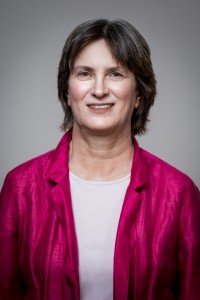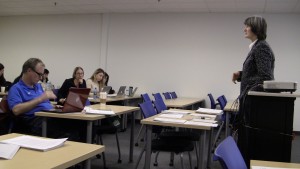
Mathematics Professor Tatiana Shubin, center, will present a talk on her research and scholarly work at the next University Scholars Series event March 27.
The University Scholars Series has been expanded this spring to include four talks by faculty members who are engaged in world-class research, scholarship or creative activities that connect to San Joes Staté University to hot topic global issues, such as social justice, civic engagement, emerging technology and STEM education.
Upcoming University Scholar Series events
Tatiana Shubin, Department of Mathematics and Statistics, on “Moving in Circles: the Beauty and Joy of Mathematics for Everyone”
March 27, noon to 1 p.m.
Dr. Martin Luther King Jr. Library Room 225/229
Ellen Middaugh, Department of Child and Adolescent Development, on “Coming of Age in the Era of Outrage: Digital Media and Youth Civic Development”
April 24, noon to 1 p.m.
Dr. Martin Luther King Jr. Library Room 225/229
Sandra Hirsh, School of Information, on “Blockchain: Transformative Applications for Libraries and Education”
May 8, noon to 1 p.m.
Dr. Martin Luther King Jr. Library Room 225/229
All events are free and open to the public. Lunch will be served.
Abolitionists and Education
Professor of Comparative Religious Studies Jennifer Rycenga launched the spring series on February 20 with a talk entitled, “Intersectional Pilgrims in Canterbury: The Story of America’s First Female Academy for African-American Women.” She has been immersed in writing a comprehensive cultural biography of white Abolitionist educator Prudence Crandall (1803-1890) who has interested Rycenga since first discovering the fellow educator in the late 1990s. She learned of Crandall when she traveled to New England to visit the historic Crandall Academy, which now houses a museum. She soon recognized that the Academy’s founder had a rich story.
Rycenga, who teaches in the College of Humanities and the Arts Department of Humanities, has long had an interest in Abolitionist history, women’s religious history, feminist theories of music, and theoretical issues concerning philosophies of immanence and panentheism. Her latest work combines several of those interests.
During her University Scholars Series talk, she shared a story from Canterbury, Conn. circa1830s, where women and men, Black and white, young and old, worked together to offer advanced formal education for Black women. Crandall became their teacher, and though the school was subjected to “constant racist vigilante and legal violence, the education and learning there were genuine,” Rycenga said.
Math Circles
Award-winning Professor Tatiana Shubin will give a talk on March 27 on “Moving in Circles: the Beauty and Joy of Mathematics for Everyone.” In 2017, she received the Mary P. Dolciani Award, which recognizes a pure or applied mathematician for making distinguished contributions to the math education of students in the United States or Canada. She is credited with creating the San José Math Circle as a weekly space for middle and high school students to gather to engage in problem-solving work.
She is also a co-founder of the first Math Teachers’ Circle Network in the U.S., as a professional community of K-12 mathematics teachers and mathematicians. Groups meet regularly to work on rich mathematics problems, allowing teachers to enrich their knowledge and experience of math while building meaningful partnerships with other teachers and mathematicians.
In 2012, she launched the Navajo Nation Math Circles project and became co-founder/co-director of the Alliance of Indigenous Math Circles. She aims to spread the culture of problem-solving and the joy of mathematics to Native American students and teachers.
Youth and Online Civic Engagement
Assistant Professor of Child and Adolescent Development Ellen Middaugh’s talk on April 24 is entitled, “Coming of Age in the Era of Outrage: Digital Media and Youth Civic Development.” Her research examines the impact of technological change on youth development and applications for civic education in and out of schools. Her most recent article “More Than Just Facts: Promoting Civic Media Literacy in the Era of Outrage” was published in January in the Peabody Journal of Education.
She will be sharing findings from a series of studies that shed light on the impact of outrage language on youth interest in political engagement, their capacity for evaluating political information and the potential for innovative classroom practices to address these dynamics.
Transforming Education with Blockchain Technology
On May 8, Director of the School of Information (iSchool) Sandra Hirsh will offer a talk entitled “Blockchain: Transformative Applications for Libraries and Education.” She has led an 18-month investigation of blockchain applications and use cases for libraries that has been informed by technology experts from libraries, blockchain developers and urban planners. The project was named by Forbes as one of the 20 ways the new technology will transform education.
On the iSchool blog there is a description of the technology: “A blockchain is exactly what it is named, a chain of blocks. Each block contains a record of information, such as a deed for a house, the metadata for an image, or potentially, a bibliographic record. The chain that links these blocks together means that if someone wants to change the information in one block of the blockchain without that change being obvious, they would also need to change each individual block that comes before it in the chain. The blockchain is also set up to be distributed, which means that it is copied many times and each copy is located on different computers at different locations.”
This spring, Hirsh will publish a book, Blockchain, as part of the Library Future Series and a massive open online course (MOOC) entitled “Blockchain and Decentralization for Library and Information Science” will be offered as part of the project.
Hirsh published a second edition of her book Information Services Today: An Introduction in 2018 and co-founded the Library 2.0 global virtual conference series in 2011.

